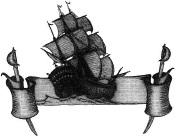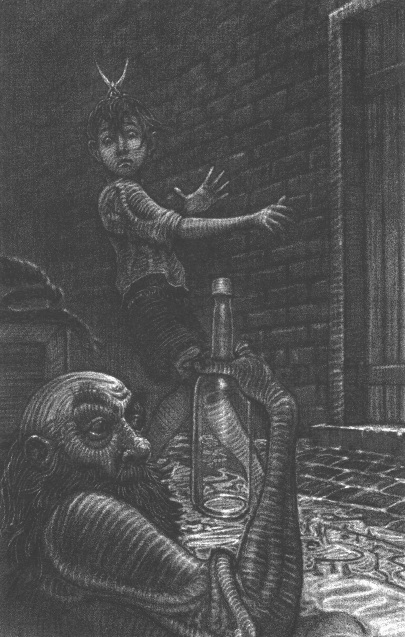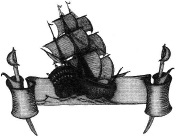Peter and the Shadow Thieves (18 page)
Read Peter and the Shadow Thieves Online
Authors: Dave Barry,Ridley Pearson
Tags: #Juvenile Fiction, #General, #Action & Adventure

INTO THE STORM
I
N THE SAIL, PETER LISTENED, teeth chattering, as Tinker Bel delivered the bad news.
Tonight, she was saying.
When it’s dark. They’re waiting for
…
Here the bel s stopped, and Tink shivered, which was how she indicated the dark shape that prowled the ship by night.
“Did they say where Mol y’s house is?” Peter whispered.
No,
Tink answered in the curt tone she used whenever Mol y’s name came up.
Just that the father’s not there.
Peter frowned, considering the bleak picture Tink had painted. Mol y and her mother were alone in a house, and the men on the deck below were going after them tonight. To make matters worse, these men apparently had the police, or at least some of the police, on their side. Mol y’s house was protected by guards, but the men below weren’t worried about them.
Nor should they be,
thought Peter, remembering how the dark shape had dealt so easily with the Mol usk warriors.
Now, to make matters worse, it began to rain, a cold drizzle that found its way down through the sail folds, making Peter thoroughly miserable.
“We need to get out of here,” he whispered.
Tink agreed with an immediate burst of bel s:
Let’s fly ashore.
“I wish we could,” said Peter. “But they’l see us. Or they’l see me, anyway.”
The rain was coming harder now, the drops like cold pebbles, drumming on the canvas. Tink worked her way up to the sail opening and peeked down toward the deck.
No one’s there,
she reported.
They must have gone down to get out of the rain.
“Real y?” said Peter. “Do you think we could get out of here without being seen?”
Tink took a look at the sky.
Wait a few minutes,
she said. It’s
going to rain much harder.
Peter did not question this. Tink, being part bird, knew a great deal about the weather.
Sure enough, a few minutes later, a massive cloud bank swept in, bringing with it a blinding, drenching deluge. Peter, now too soaked to care if he got any wetter, climbed out of the sail and stood on the yardarm. He had no worries about being seen; he couldn’t even see the deck through the swirling fog and rain, and he had to hang on to a rope to keep from being blown off the ship. Tink, not one to show dependence of any kind, nonetheless held on to his shirt with both hands.
“Ready?” Peter shouted.
Tink nodded, a bit uncertainly.
“Al right, then,” said Peter. “Let’s go.”
And with Tink stil holding tightly to his shirt, Peter launched himself into the storm.


NOT SAFE AT ALL
P
ETER, WITH TINKER BELL clinging to him, struggled to fly through the blinding rain, his body hurled this way and that by the swirling wind. He hoped he was heading toward the dock, but the visibility was so poor he couldn’t be certain.
Angling his body downward, he descended and saw that he was over the roof of a long, low building. He fol owed it to an edge, then dropped as quickly as he dared to the ground. He found himself in a dim, debris-strewn al ey between two warehouses. He stood for a moment, panting, hands on knees, water streaming down his body.
“Hey, there!” rasped a voice behind him. “Mind where you drip!”
Peter spun around and saw he was standing practical y on top of a scrawny, bearded man sitting on the hard-packed dirt under the warehouse eave, cradling a bottle in his lap.
The dirt was quickly going to mud.
“S…sorry, sir,” said Peter.
“Sir? Sir? Haw-haw
harrggghkh-TOOEY.
” The man’s laugh trailed off into a rough, wet cough, which turned into a spectacular spit. When he was done, he wiped his mouth on his sleeve and looked up at Peter with a broad, toothless smile. “Sorry, lad. Struck me funny is al . Nobody cal s old Trumpy ‘sir.’ That’s me name: Old Trumpy. You cal me that. What does I cal you?”
“Peter,” answered Peter.
“A good name, Peter,” said Old Trumpy. He raised the bottle to his lips and tried to take a swig, only to discover that it was empty. Disappointed, he set the bottle down again, then continued: “I had a dog once named Peter. Or maybe it was a cat. It was an animal of some kind, that much I recal . But it might not have been named Peter. Did you fal ?”
“What?” asked Peter.
“One minute,” said Old Trumpy, “you wasn’t here. Next minute you was. But you didn’t come from this way or that,” he said, nodding to each end of the al ey. “So I’m asking, did you fal ?”
“Oh,” said Peter. “Yes. From the—” He glanced up. “From up there. The roof.”
Old Trumpy nodded sympathetical y. “I fal s a lot meself,” he said. “I find it’s better if I just sits and don’t bother with the standing.” He frowned, his eyes trying to focus on something just above Peter’s head.
“What did you say your name was again?” he said.
“Peter.”
“That’s right,” said Old Trumpy. “Peter. Wel , Peter, do you mind if Old Trumpy asks you a question?”
“No.”
“Is there a very smal person sitting on your head?” He pointed a wrinkled hand at a spot above Peter.
Peter’s own hand shot up.
Tink.
He grabbed her and, ignoring the angry peal of bel s, stuffed her under his shirt.
“No, sir,” he said. “I mean, no.”
Old Trumpy blinked several times and looked relieved. “Good,” he said. “Sometimes, when I has me rum, I sees things that ain’t there. First time for a very smal person, though.
Usual y it’s snakes.” He raised the bottle to his lips again, only to discover that it was stil empty.
Peter said nothing. Tink, on the other hand, had a great deal to say from under his shirt, including some unkind comments about Peter’s personal hygiene.
“Do you hear bel s?” said Old Trumpy, glancing around.
“No!” said Peter.
“Wel , I do!” said Old Trumpy, frowning. “That’s another new one. Usual y I just sees things.”
Let me out!
said Tink, not quietly.
“There it is again,” said Old Trumpy.
“Be quiet,” hissed Peter to Tink.
“What?” said Old Trumpy.
“Nothing!” said Peter.
“I thought you just said be quiet,” said Old Trumpy.
“No,” said Peter. “I mean, yes, I did, but not to you.”
“Then who did you say it to?” said Old Trumpy.
“I, er…to myself,” answered Peter.
“Ah,” said Old Trumpy. “I does that meself sometimes. I’m talking thirteen to a dozen, and then I notice there’s nobody there. The bel s is new, though.” He attempted another swig from the bottle. Empty stil .
Peter looked toward the near end of the al ey. The sky was lighter, the rain abating.
“Sir,” he said. “I’m trying to find a house here in London.”
“Oh, there’s lots of houses here in London,” said Old Trumpy. “Thousands, I should think. Shouldn’t be no trouble finding one.”
“But I’m looking for a certain one,” said Peter. “A particular one.”
“Ah,” said Old Trumpy. “That could be harder.”
“It belongs to a family named Aster,” said Peter. “Lord Leonard Aster.”
“
Lord
Aster, is it?” said Old Trumpy. “It’s a lord’s house you want?”
“Yes,” said Peter.
“Haw-haw
harrggghkh-TOOEY
” said Old Trumpy, producing another impressive fountain of phlegm, from which Peter looked away.
“Sorry,” said Old Trumpy. “No offense…What’s your name again?”
“Peter.”
“No offense, Peter, but you don’t look like the nobility type.”
“But do you know the house?” said Peter.
“What house?” said Old Trumpy.
“Lord Aster’s,” said Peter, trying not to show his exasperation. “Do you know where he lives?”
“Not around here, I can tel you that, haw-haw,” said Old Trumpy, gesturing around the filthy al ey. As he did, a rat scurried from one rubbish mound to another.
“Wel , do you know where I might look for him?” said Peter.
Old Trumpy considered this question thoughtful y for a moment, then said: “Look for who?”
Peter sighed. “Never mind,” he said. He started walking toward the end of the al ey.
“You’re off, then?” cal ed Old Trumpy.
“Yes,” said Peter, picking his way careful y over a pile of rubbish and jumping back as several rats scurried out. “I’m off.”
“What’s your name again?” cal ed Old Trumpy.
Peter stopped, sighed, turned around. “Peter,” he said.
“Right, Peter,” said Old Trumpy. “Listen, son, you be careful out there. It ain’t safe ’round these docks, especial y for a young lad like you. And it ain’t safe for nobody nowhere in London when dark comes.” He drew a finger across his throat. “You can’t trust nobody out there, lad.
Nobody.
That’s why Old Trumpy stays in here.” Peter, saying nothing, turned away and resumed picking his way toward the end of the al ey, leaving Old Trumpy talking to himself.
“Ain’t safe for nobody,” he muttered. “Not nowhere at al , not with night coming.”
Then he tried another swig from the bottle, which, to his mild surprise and considerable disappointment, remained empty.

A BONE TO PICK
S
LANK WAS WATCHING the crew of
Le Fantome
like a hawk.
He’d been at sea since the age of thirteen; he knew sailors, and he knew that London, with its many temptations, beckoned to them powerful y, despite Nerezza’s orders to remain on the ship. Guards were posted at the gangway to keep the crew from walking off, but Slank knew that many of the men—if they thought nobody was watching—wouldn’t hesitate to slide down a line to the dock, or even jump into the filthy Thames and swim for it. And once they’d gotten ashore and fil ed their bel ies with grog, it was only a matter of time before they were wagging their tongues about the ship’s strange voyage—and the even stranger passenger it carried.
But Lord Ombra did not want word of his presence to get out, not yet. And Slank shuddered to think of the consequences if Lord Ombra was displeased. So Slank passed the idle hours awaiting Ombra’s appearance prowling the decks, keeping close watch on the increasingly restive crew.
At the moment, most of the crew had gathered forward along the rail to watch a bloody, drunken brawl taking place outside the Jol y Tar, a notorious dockside pub. With the men temporarily distracted, Slank decided to scale the rat lines that led to the crow’s nest. From here, high above the deck, he had a good view of the ship and a stunning view of the city, stretching into the distance under a late-morning sky dark with coal soot.
Twenty minutes passed. Thirty. The fight ended, and the crew of
Le Fantome
went back to sitting around. Slank fixed his attention on the bow lines, then the stern, then back again. He looked port and starboard; he kept his ears attentive for the sound of whispering. A light breeze blew, bringing with it the scents of the city, some foul, some—like the smel of fresh food cooking—sweet. The furled sails slapped, a sound familiar and pleasant to any sailor. As the stiff fabric flapped, its folds opened and shut, like the bel ows of an accordion.
What was that
?
Slank stared aft, into one of the folds of a sail attached to the mizzenmast. He had the perfect angle as the breeze blew and the sail sagged open. The breeze calmed, and it slipped shut again, like a giant purse closing.